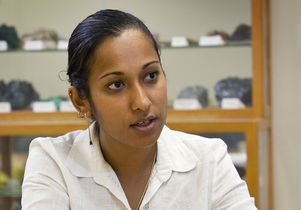Tripati pioneered a new method of studying climate change through Earth’s history by using molecules in fossilized marine shells from millions of years ago. Her research brings awareness of the effects of different CO2 levels on historical climate change and can be used as a tool for policy-makers to understand how varying levels of CO2 could affect the planet, including its influence on the global distribution of animals and plants.
Tripati’s “brilliant science gives climate deniers no wiggle room, demonstrating beyond doubt the links between carbon dioxide pollution, global climate change and the history of life on Earth,” said Kierán Suckling, the center’s executive director.
“At this pivotal moment in Earth’s history, climate change poses one of the most dire threats to the preservation of biodiversity,” said E.O. Wilson of Harvard University, known as the father of biodiversity. “I congratulate Dr. Tripati on her award and urge other scientists to follow her example in advocating for reduced carbon emissions to safeguard the stable climate conditions on which all life on Earth depends.”
Tripati’s chemical techniques for understanding past climate have a very low uncertainty rate and allow scientists to estimate CO2 levels millions of years ago with a high level of confidence. Her research provides solid evidence that CO2 is linked historically with environmental shifts, such as changes in plant and animal ranges, ice distribution, sea levels and monsoon intensity.
“I’m honored to receive an award named for one of the true giants of modern science,” Tripati said. “E. O. Wilson’s pioneering work helped inspire my own research, and his lyrical descriptions of our planet’s incredible biodiversity also highlight how much is at stake as global warming begins to alter our world. My great hope is that science can help us preserve a livable climate.”
Tripati’s work revealed that the last time CO2 levels were as high as they are today was 15 million to 20 million years ago, when the distribution of plants and animals was dramatically different, global temperatures were 5 to 10 degrees warmer, and the sea level was 75 to 120 feet higher than today. Her research suggests that the CO2 threshold for maintaining year-round Arctic ice may be well below modern levels.
In addition to climate, Tripati conducts research on changing coastal environments and the impact of ocean acidification on marine invertebrates such as mollusks, corals and sea urchins.
The Center for Biological Diversity is a national, nonprofit conservation organization dedicated to the protection of endangered species and wild places.

